For a long time it seemed like Mazunte was immune to the Corona Craze. Until mid March life on the beach seemed completely unaffected, though stories about mounting cases and authoritarian responses worldwide were making the rounds. Even when the federal police came to close the beach, the people here, tourists and locals alike, ignored the authorities even while they were here. In fact, the only point when the situation turned serious was when the local authorities decided to take the situation seriously.
Admittedly, we did share a few beers on the beach on a Sunday afternoon two weeks ago, coming right back just after the local cops had chased us away, and only a few days after declaring prohibition. But that time resistance did not prevail. The beach remained deserted, and the rest of the town too, for that matter. Once the local stores had sold off their remaining supplies, alcohol became harder and harder to find. And together with it parties, (loud) music, and public congregations started to be cracked down on. Most importantly, however, the connecting road to neighboring communities has become highly regulated.
Are You IN Or Are You OUT?
At first having a mere road block caused a minor outrage, but it was declared that this was the only way the town could save itself. And since the decision was made by “the community” it was up to each and every person to decide if they wanted to leave, or stay and thus accept these responses in dealing with the global heath situation.
For us it was no question: this was the place we were going to be building our earthship theater, and since we were in the middle of another construction project, we wouldn’t be going anywhere. Making use of the last day to go to nearest bigger town of Pochutla, we stocked up on as much food as possible, and started waiting. However, it’s no fun to be questioned regarding our purpose whenever we walk through the village, let alone putting up with the arbitrary measure of keeping us off the beach. But what else could we do but to comply with whatever insane rules they were dishing out. They were the community, after all.
Join Them If You Can’t Beat Them
A possible solution offered itself when our neighbor, who has also been treating the wood for our roof beams, invited us to be part of a voluntary task force in manning the filter. It didn’t take us long to realize the possible benefits such an involvement offered, so we seized the opportunity. The five guys of our little group went up one Friday to help at the checkpoint on the road to Mazunte from 8 a.m. to 8 p.m.
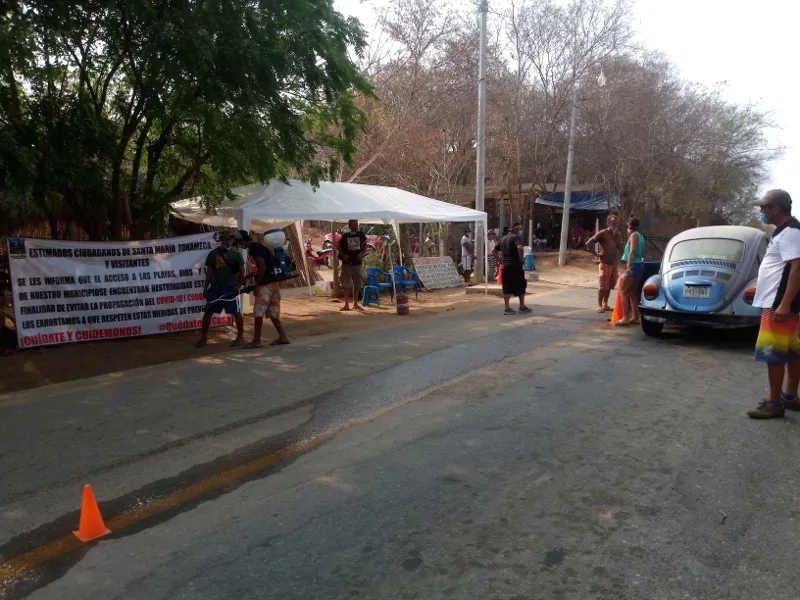
There, we joined the local guys our neighbor organized, as well as the higher tiers of organizers. At our backs we had some members of the local police, and a squad of local women cooking up a storm for all the volunteers guarding the town from invasive viruses. All in all there were at least twenty people, in a way defeating the whole point of social distancing… but hey!
Crossing the Filter Leaving Mazunte
While you can’t keep anyone from leaving town, it is essential to let people know that unless they fall into a certain category, they won’t be allowed back in. Of course, it’s a different matter if they live in Mazunte. But that case it may be more difficult for them to get permission to leave the next time.
The acceptable excuses for leaving include doctors’ appointments (with a written notice), going to certain pharmacies (with a prescription), going to the town of San Antonio on the main highway, which includes a gas station, and a place where bills can be paid. What it does not include is going to Pochutla for banking (anything more than taking out cash from our local ATM), grocery shopping (anything more than what our local shops have to offer), or any other possible things that is deemed non-essential. Also, if there are more than two people in the vehicle it won’t be allowed through, and even those who can pass have to return within a reasonable time, or they will be forced to justify themselves when they come back.
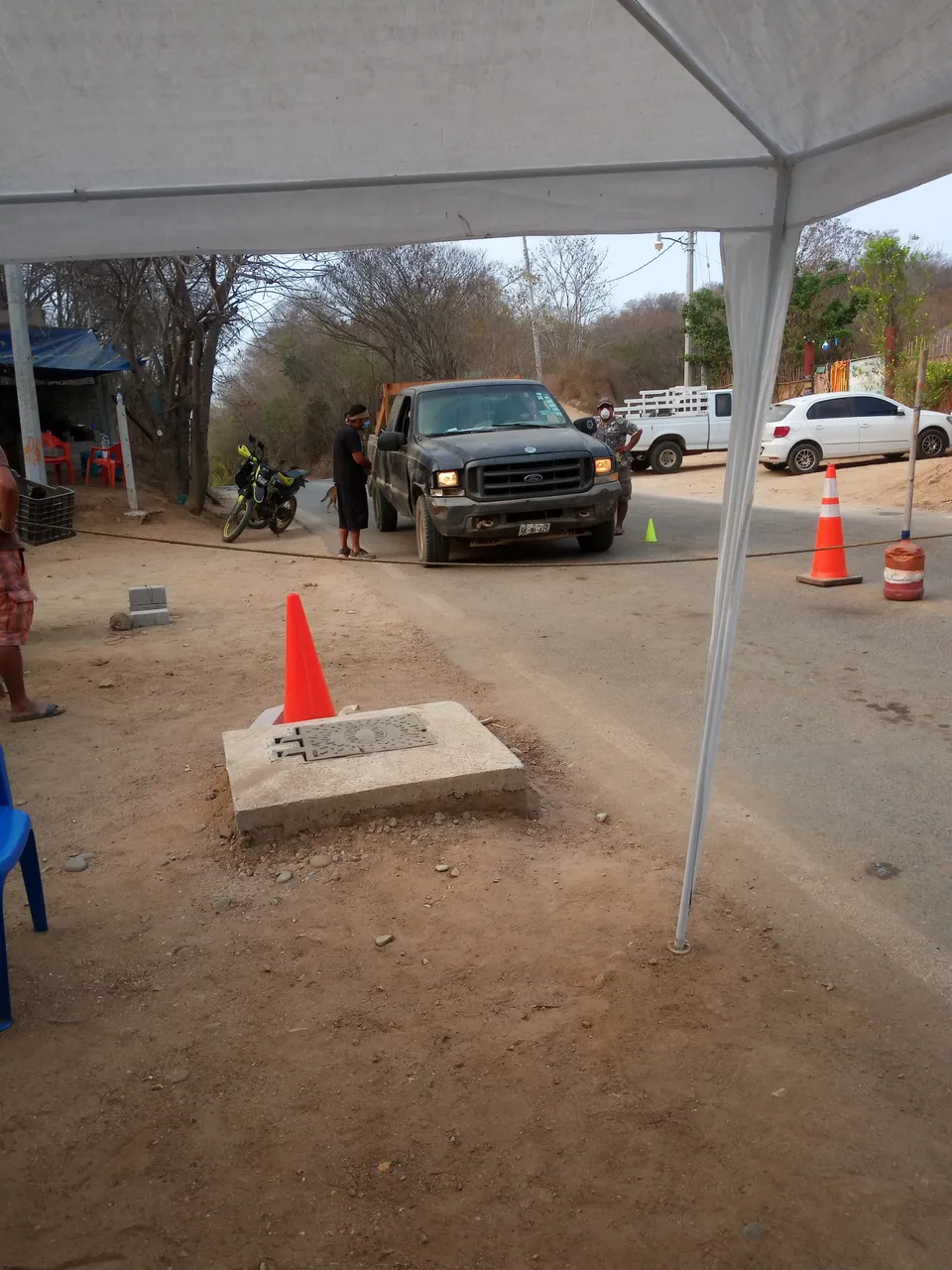
As one can guess, inquiring all these things can seem a bit touchy to the individual’s freedom of movement. Also, it would be more than slightly off-putting to Mazunteños to be questioned in this way by non-locals, let alone foreigners. Thankfully we had sufficient people of Mazunte in our group, as well as Jonathan, our last volunteer, who decided to spend the quarantine with us.
Not only is he a trained psychologist, highly empathic to all people, and super social, having made friends with half the town in the few weeks he’s been here. But being Mexican himself, even though from the State of Mexico right next to the capital, made it easier for people to relate to him. So we were all glad that he accepted this job so eagerly, talking to the folks heading out. In the meantime, the rest of us foreigners focused on the technical tasks concerning those coming into town.
Crossing the Filter Coming In
Though the vehicles entering Mazunte had to undergo some questioning too, there were a few things we had to make all of them do: getting out of the car, washing their hands, having their temperature taken, and letting us fumigate the vehicle. None of these tasks was too big of a deal, really, but I can see how all of it together may have seemed a bit too much to put up with. Particularly, since none of these measures made really much sense.
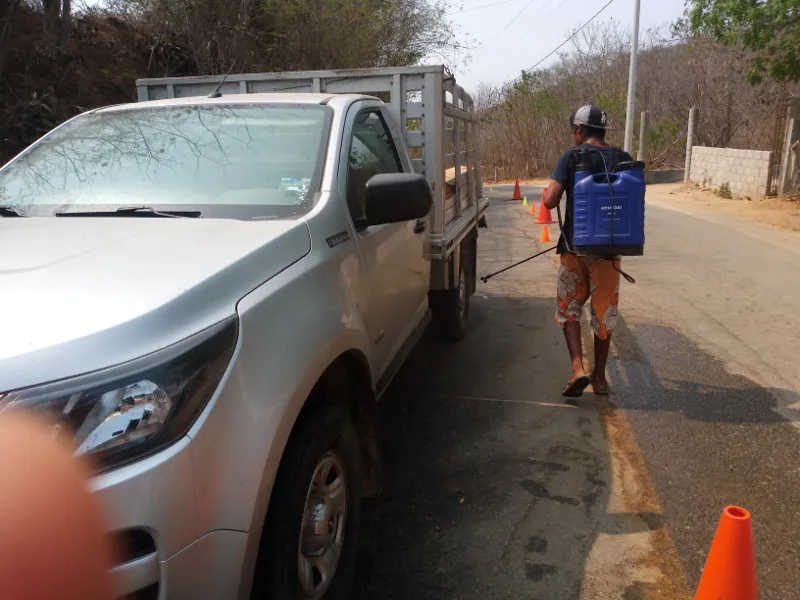
Spraying a chlorine solution onto the tires and the outside of the car didn’t seem like an effective way to fight the virus. If anything, we should have sprayed the inside of the car, but that was clearly out of the question. We even asked people to raise their windows for fumigation, so they wouldn’t get the stuff on their clothes or face.
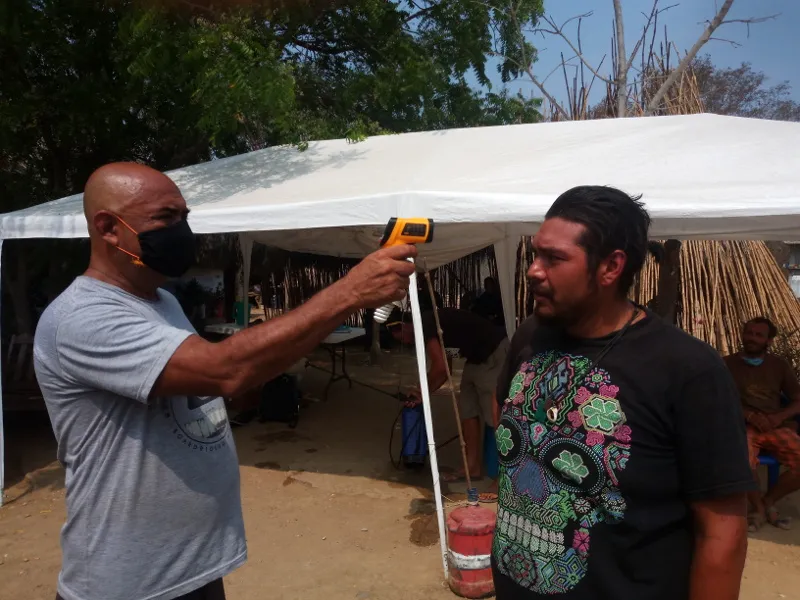
The super high-tech laser thermometer gun we used to point at people’s foreheads (how lovely!) seemed completely off. Most people got a reading of 33 or 34 °C (91-93 °F), some as low as 30 °C (86 °F), but no-one above 35 °C (95 °F). Were all these people suffering from hypothermia, or was the thermometer not calibrated properly? One possible explanation is that it took the skin’s surface temperature and not inside of the body, but even so it made the whole exercise seem equally futile for us performing it, as well as for those undergoing it.
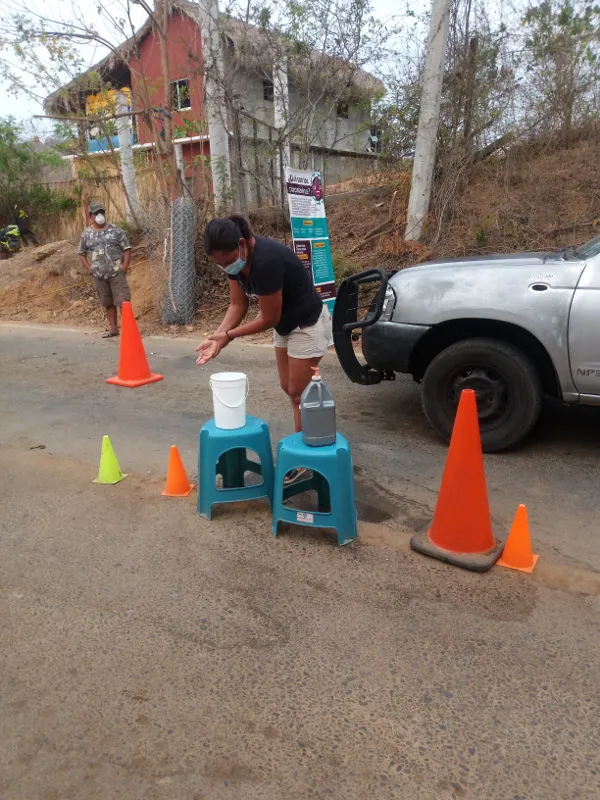
Washing hands, finally, is not a bad idea, whether during the virus scare or not. But precisely for that reason folks are likely to carry their own hand sanitizer with them. Others simply don’t care, which means we had to make everyone get out and wash their hands, demonstratively, to show to the world that someone is doing their part. Great! But utterly pointless, especially since there were a certain few people who demonstratively refused to comply with any of these rules.
Rules, Being Ruled, and Refusal of the Rule
While the majority of the people passing through the filter had no problems submitting to anything we asked of them, we did see our share of rebels, rising up against these arbitrary actions on part of the community. One lady, coming back from a palm-leaf gathering errand in her pick-up, declared that she was from Mazunte, before driving right through our checkpoint, pulling the barrier rope until the metal hook at its end got bent undone.
The police on the sidelines were just watching her with the same disbelief as us, but could not do a thing about it. Since all these measures were put in place by the community and not the state or federal government, all they could do was show presence, and make sure the situation didn’t escalate.
Another well-worded resident started reading excerpts from the constitution, questioning the entire effort of the filter, all in a calm but firm manner. This led to a half-an-hour discussion each, on his way out and back in again, though in the end they let him through. Supposedly his reputation in the town would be damaged, and the next time they would give him an even harder time to leave… but at least on our shift he managed to get his way.
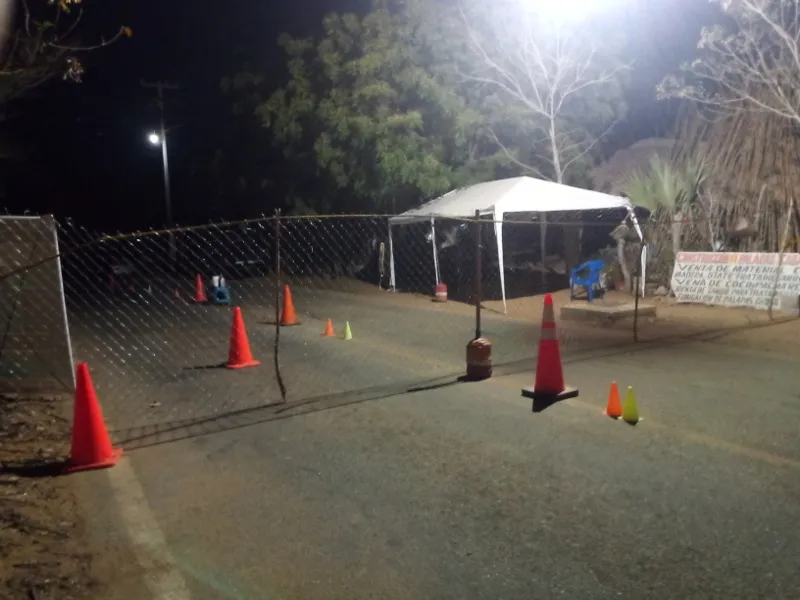
Other than these two incidences our shift was mostly uneventful. At 8 p.m. we drew a piece of chainlink across the road, leaving the filter for the night shift.
What’s In It For Us?
So what was the whole point of spending the entire day in a place without games or music, generally exposed to the sun, performing pointless tasks, getting on people’s nerves, while getting bored out of our minds? Other than a genuine insight into the workings of the filter, and this article it got me to compose, it made us feel part of the “good side”.
Recognizing the faces of the organizers, the other volunteers, and the cops behind them, is not a bad thing, particularly if they recognize you too! Needless to say, after that first shift I took a walk down to the now completely deserted beach with Julia. On the way we passed a police truck, who did not turn us around, or even ask us a question about where we were going. I’m not sure if they recognized me or if they just didn’t care, but it certainly strengthened my sense of reassurance.
As for the future, we may have to preform these duties on a regular basis, but since there are fourteen brigades already, it won’t have to be more often than once a week. And for next time, we’ll be given the night shift, so we won’t get too bored. Given the fact that at night no one is allowed to pass, it almost promises to be a recipe FOR boredom. But at the same time, there may be other hidden benefits on the horizon. Let’s wait and see…
Read the Whole Series!
This is part of my series on how the Coronavirus has affected life in a small surfer town on the coast of southern Mexico. If you’re interested in the earlier parts of story, please check out these previous posts: